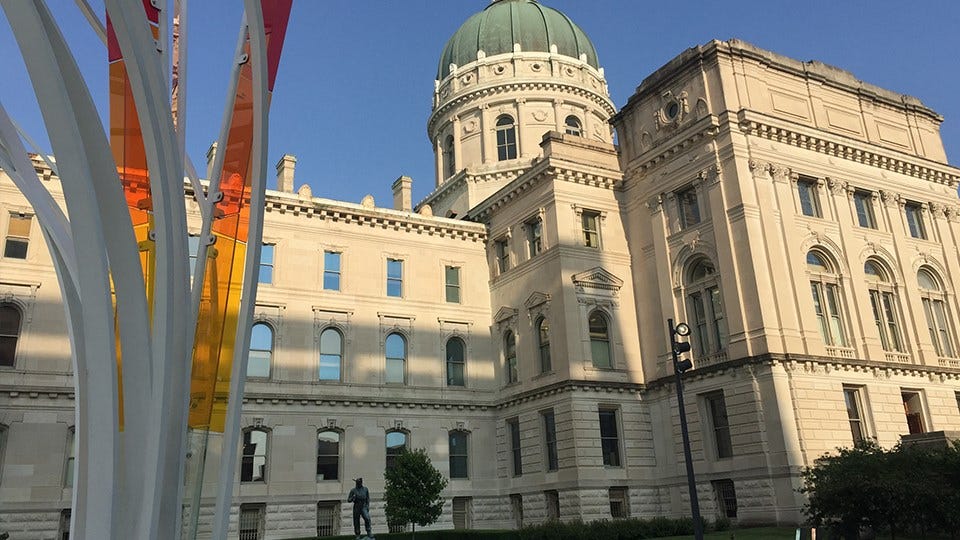State accounting for billions in federal aid
Subscriber Benefit
As a subscriber you can listen to articles at work, in the car, or while you work out. Subscribe Now
Billions of dollars in federal aid came to Indiana over the course of the COVID-19 pandemic, helping to stabilize governments and keep the economy moving.
The state spent nearly all of its coronavirus stimulus money and is now attempting to use a dwindling pot to cover increased cost estimates for capital improvement projects as inflation bloats their spending.
In some cases, the Office of Management and Budget has reallocated dollars from the American Rescue Plan to cover gaps in funding for capital improvement projects, including $15.6 million for the Indiana Law Enforcement Academy.
Zac Jackson, the state budget director, said the General Assembly had allocated the $350 billion in federal funding but the budget committee could also direct unspent funds elsewhere, including projects like the academy. He spoke at Wednesday’s State Budget Committee meeting.
The Academy project came in 22%, or $15 million, over the original $70 million estimate earlier this month. The cost approved by the budget committee came to $78.6 million, with general funds covering $63 million while federal monies filled the gap.
Rep. Greg Porter, D-Indianapolis, criticized this maneuver, saying he didn’t feel the Indiana Office of Management and Budget was transparent about spending billions in federal funding – including the $2.4 billion Indiana received under the Coronavirus Aid, Relief and Economic Security (CARES) Act in 2020.
“If you look at the minutes, you’ll see that we’ve asked these questions over and over,” Porter, a member of the budget committee, said. “I’m just perplexed by the process.”
Near the end of a four-and-a-half-hour meeting, Cris Johnston, director of the Office of Management and Budget, quickly delved into a slideshow presentation on allocations from those federal funds.
Johnston said just $110 million remained in CARES funding, which would be transferred to the Unemployment Trust Fund providing unemployment benefits to thousands of unemployed Hoosiers. The final report for CARES funding will come at the end of the year.
The vast majority of funds from the American Rescue Plan – $3.1 billion – were allotted in the 2021 budget while the committee has approved funding for an additional $43 million. The state still has approximately $190 million left to spend.
The influx of federal funding means the State Board of Accounts has been inundated with more audits than usual to account for those dollars.
The agency must perform an audit every time a municipality – city, county or township – receives more than $750,000 in federal financial assistance in addition to regular audits of government funding.
“As you can imagine, with all of the sums flowing from the federal government to the state and to the locals, that increases the number of audits we are required to perform,” Kendra Leatherman, the agency’s general counsel, said.
Leatherman said the number of audits overseen by the office has increased by 30% but, with federal funding adding a layer of complexity, the time spent on audits has seen an increase between 65-100%.
To comply with their statutory deadlines, the agency asked for $6.2 million to contract with a certified public accounting firm to assist with auditing. she warned the same request would come again in future years because the federal funds must be spent by 2026.
“This is an ongoing request,” Leatherman said, noting the agency had asked for funding last year too. “We still have the same need from this year as (we did) last year and we don’t anticipate that going away anytime soon.”
Many municipalities chose to allot their federal monies in smaller portions to multiple projects, complicating the auditing process. But the state limits how much the agency can charge local governments to $175 per day when costs could reach up to $190 per hour.
Performing an audit may take up to 76 days for the financial portion and another 15 days for the federal portion. For the 15 days under the federal portion, the agency can charge the full cost of the audit.
Leatherman said, previously, cities and counties might only be audited once every four years but the flow of federal funds meant everyone needed to be audited at once.
“Historically, it’s been a give and take between the locals and the legislature on what the cost for an audit is,” Leatherman said. “It doesn’t work like that when we have all of this extra work.”
The Indiana Capital Chronicle is an independent, not-for-profit news organization that covers state government, policy and elections.
